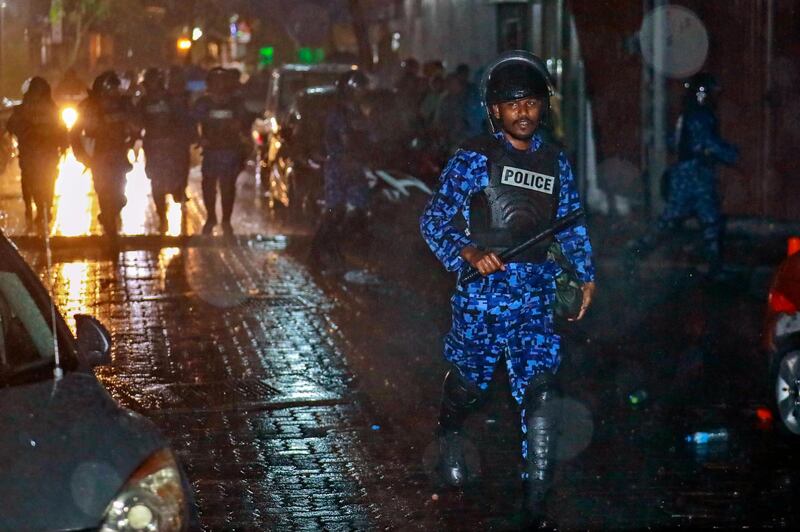The main political rival to the president of the Maldives called on India on Tuesday to send an envoy — backed by its military — to free imprisoned Supreme Court justices and opposition leaders, as political turmoil battered the Indian Ocean nation.
The request from exiled former president Mohammed Nasheed came as Maldives security forces stormed the Supreme Court building overnight, arresting two judges and later a top opposition politician, after the government declared a state of emergency.
The government of president Yameen Abdul Gayoom has moved to assert its power since the Supreme Court ordered several imprisoned opposition politicians to be freed late last week. The government announced a 15-day state of emergency Monday night, giving it sweeping powers, including to make arrests, search and seize property and restrict freedom of assembly.
Mr Nasheed, who was among the opposition politicians ordered freed by the Supreme Court and who is now in neighbouring Sri Lanka, denounced the government's actions.
"President Yameen has illegally declared martial law and overrun the state. We must remove him from power," he said in a statement, calling for the Indian envoy and military to be sent. "We are asking for a physical presence."
He also called on the US to stop Maldives government officials from making transactions through US banks.
There was no immediate response from India.
Mr Yameen has cracked down on civil liberties since coming to power in 2013, imprisoning or forcing into exile nearly every politician who opposes him.
Hours after the emergency was declared, security forces in riot gear and blue camouflage stormed the Supreme Court building, arresting two of its judges, including Chief Justice Abdulla Saeed. It was not immediately clear what charges they faced, if any. The whereabouts of the court's other two judges were not clear Tuesday.
Later, former dictator and opposition politician Maumoon Abdul Gayoom was seen on cell phone video shot by his daughter being quietly escorted from his home by security forces, hugging friends and family and waving to supporters before being driven away.
Shortly before his arrest he sent a message on Twitter saying a large deployment of police had surrounded his house: "To protect me or to arrest me? No idea."
His lawyer, Maumoon Hameed, said Mr Gayoom faced charges including bribery and attempting to overthrow the government.
Mr Gayoom was president from 1978 to 2008, when the Maldives became a multiparty democracy.
______________
Read more
Maldives government in standoff with supreme court
Clashes in Maldives after top court clears opposition politicians
______________
The Maldives is an archipelago of more than 1,000 islands with fewer than 400,000 citizens, more than one-third of them living in the crowded capital city, Male. Tourism now dominates the economy, with wealthy foreigners flown to hyper-expensive resort islands.
But it remains, in many ways, a small community. Mr Gayoom, the former dictator, is the half brother of president Yameen. The two men are now political enemies. Mr Nasheed, the opposition leader, unseated Mr Gayoom in the country's first democratic elections in 2008. But he and Mr Gayoom are now political allies in an opposition alliance.
The surprise, unanimous Supreme Court ruling last week ordering the release of the imprisoned opposition leaders has led to increasing turmoil, with Mr Yameen lashing out at the court, opposition protests spilling into the streets of Male, and soldiers in riot gear stopping lawmakers from meeting in the parliament building.
The UN, US and other foreign governments have urged the Maldives to respect the court order.
During Mr Gayoom's rule, he was repeatedly the only candidate for the presidency.
Mr Nasheed resigned during his presidential term following protests over the arrest of a judge. He lost the 2013 election to Mr Yameen, then was convicted under Maldives' antiterrorism laws in a trial widely criticised by international rights groups.
He was granted medical leave in 2016 and travelled to Britain where he was granted asylum.
Mr Nasheed said last week after the court ruling that he would mount a fresh challenge for the presidency this year.
China, Australia and the US updated their travel advice during the latest unrest. China urged people to avoid travel there and Australia and the US told citizens to be cautious.
There is a history of Indian military involvement in the Maldives.
In 1988, Sri Lankan militants working for a Maldivian businessman tried to take control of the country and seized control of many government buildings.
Then-president Gayoom asked for Indian military help to drive back the militants. India dispatched 1,600 paratroopers to the Maldives, who quickly restored Mr Gayoom's control.





